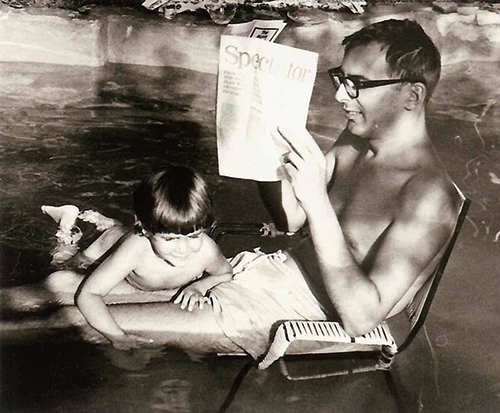The race isn’t run
Sir: Bravo Fiona Unwin (‘Rooting for Rishi’, 6 August) for the best piece I have read on the grassroots take on the Conservative party’s leadership election. Having attended several such hustings both this time and over the years, this one does remind me of 2005: David Davis vs David Cameron. Lots of career-focused senior MPs backing an early front-runner, and then quiet reflection from the life-experienced sensible grassroots membership. Few predicted the 2005 winner until that electric party conference speech. This time, with dozens of events like the one the vice-president of West Suffolk describes, the typical Spectator reader rather than the Westminster hack will select the next prime minister. It’s all to play for.
Tony Devenish
London W2
Required reading
Sir: Matt Ridley’s article ‘How to be PM: ten rules for the next Tory leader to live by’ (6 August) is brilliant; it should be widely circulated to everyone, not just prospective PMs. It’s a masterpiece, simply a masterpiece!
Derek Cross
Brenchley, Kent
National health scandal
Sir: Anyone still believing the NHS a national treasure – worthy of the George Cross it was awarded – needs to read Lionel Shriver’s depressing piece (‘Good riddance to the Tavistock’, 6 August). No other institution could wreak damage on this scale and get away with it. Of course, nobody will be punished and the scandal will be brushed under the carpet. The Tavistock’s disgraceful history is evidence that our institutions are highly vulnerable because those running them find it easier to surrender to pressure groups than resist them. Legislation is urgently needed to bar self-selecting political pressure groups like Stonewall from access to all British institutions, from the NHS to schools and universities.
Gregory Shenkman
London SW7
Take stock
Sir: As a point of information, the Tavistock Gender Identity Clinic will be closing soon, but not the Tavistock Centre, which houses several other clinics as well as research and educational programmes. It is very confusing to keep stating that ‘the Tavistock’ will close, without this clarification.
Dr Roger Kennedy, child and adolescent psychiatrist (not at the Tavistock)
Twickenham
Out of the picture
Sir: Lindsey Sandilands’ story about pupils at her daughter’s school mistaking the postage stamp rectangle on a postcard for a place to put a picture of themselves (Letters, 30 July) reminded me of my time as a civil servant. Visa applicants had to submit a ‘selfie’, passport-style (so no smiling etc.) for their immigration file. Adults made errors such as holding their phone under their chin or submitting blurry pictures. One elderly lady used the wrong camera on her phone, submitting a picture of her washing machine.
Younger applicants, however, interpreted ‘selfie’ as a licence to use filters on their photographs. I saw it all: faces with dog ears and noses added, kittens dancing on their eyebrows, and one where the applicant’s eyes were dangling out of their skull. Another applicant used a filter that showed a bowl of exotic fruit above her head and cherries swinging from her ears, and benevolently reminded me that her picture was indeed a ‘selfie’.
Jason Singh
St. Edmund’s College, Cambridge
Habit of a lifetime
Sir: Here is a photo (below) of my father, Rostam Michael Bayandor, reading a copy of The Spectator, with me aged around two. This photo was taken in 1967 in Tehran, Iran, where we lived and where my father somehow managed to source a copy of the magazine.
I hope I won’t bore you with a potted history about him. My father’s father, Rear Admiral Gholamali Bayandor, was the first Commander of the Imperial Iranian Navy from 1933 until 1941 when he was killed during the Anglo-Soviet invasion of Iran. My grandmother, Emily Teresa Bayandor, was a courageous Yorkshire lass who found herself widowed in Iran. She fled with my father, who was just seven, managing to secure their passage to Glasgow on a troop ship. My father returned to Iran as a young man, met my mother and settled there. In 1966 the Persian Navy named a vessel after my grandfather. It is still active in the Persian Gulf. After the Iranian revolution in 1978, my parents escaped to London, where my father has lived ever since.
Through all the trauma and disruption my father has experienced in his life, The Spectator has been a constant, and one on which he has become dependent. He is most content when leafing through his latest issue. I must confess I have never read your magazine. Having fought for my father’s attention as a child and always losing to The Spectator, we are old adversaries.
Vida Saunders
London SW6

In memory of Bob Gregory
Bob Gregory, who compiled 11 puzzles for The Spectator between 2019 and 2021 under the pseudonym Smurf, died peacefully at his home in Cardiff on Saturday 6 August after a long illness. He was famous for his 20-year association with Saga Magazine, for which he compiled the very challenging weekly cryptic under his other moniker, Cullen. He also contributed well over 850 puzzles for the Jewish Chronicle, along with many other company magazines. We extend our sympathies to his wife Marian and his family.






Comments